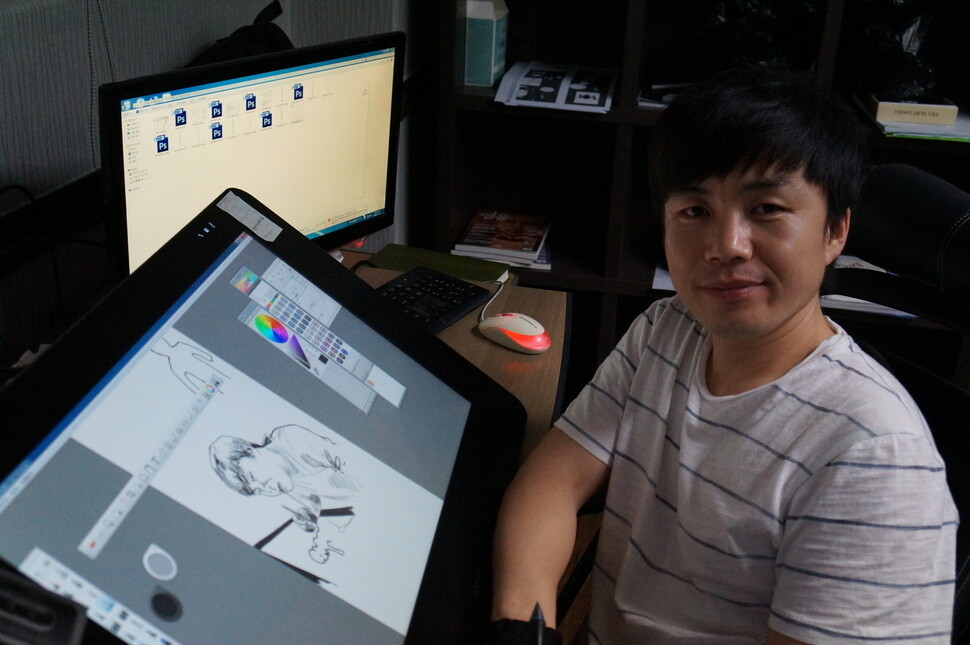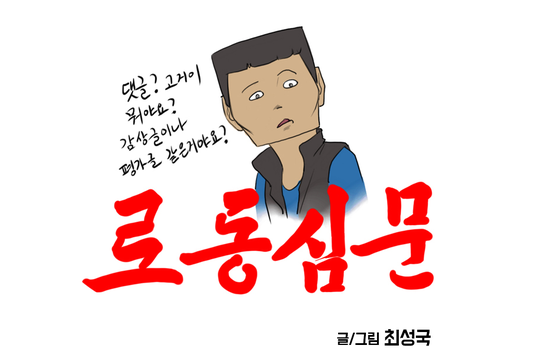hankyoreh
Links to other country sites 다른 나라 사이트 링크
[Interview] North Korean defector uses humor to spur “cultural reunification”

Choi Seong-guk is a young North Korean defector who escaped seven years ago. He lives with his mother, who defected two years before him. He sleeps an average of five hours a night. He works through the weekends. Sometimes, when he has a moment to spare, he finds a place by the banks of the Han River and watches the water flow past. It‘s his only leisure activity, his only way of releasing stress.
Choi draws, and this is the reason he is so busy. In May his webtoon series, “Rodong Simmun (sic): The Enthusiastic Resettlement Diaries of a Male North Korean Defector,” first published in Naver’s corner for user-created comics, received favorable reviews and earlier this month made it to the “best user-created comic” corner. With this comic, Choi became known as the first North Korean defector webtoon artist. Since February Choi has also been an employee at publishing house Koreaura, and his “Namdori’s Pyongyang Stories” is being serialized in Koreaura’s monthly journal “The Hero”. He also has weekly appearances on internet broadcast “Learning and Sharing TV,” where he hosts “Choi Seong-guk‘s North Korean Drawing Pad Corner.”
More than 90% of the comments on his serialized webcomic are positive. The protagonist of the webcomic is Yong-cheol, a North Korean defector. The ups and downs of Yong-cheol’s experiences illustrate the differences of culture and attitude between North and South Koreans, and many of the responses describe the comic as both instructive and highly entertaining. “The comments are so one-sided, despite the fact that this isn’t North Korea, and we don’t live in a socialist society, ha ha,” says Choi.
A Hankyoreh reporter Choi on July 11 at the Koreaura office in Seoul. Choi spoke of “cultural unification,” saying that, “Up until now, we‘ve always dealt with North Korean issues with an attitude of extreme seriousness.” According to Choi, “Guns and knives are frightening, but culture is more powerful than weaponry. When I consider my experience in the North, selling ’Korean culture,‘ I can say that nothing has as big an impact as culture.” Choi describes his goals as attempting to portray the culture of a socialist society from the perspective of a liberal democracy for the purpose of this ‘cultural unification’ he speaks of.

In the North, Choi was an animator at the Scientific Education Korea Studio, one of North Korea’s best places to work. He went to work at the studio after graduating from middle school and made two animations a month, for a total of more than 100. “It was a company for bringing in foreign capital for Kim Jong-il.” It was a dream job, where once a month he would receive meat and sugar rations, and at the end of the year even a TV or refrigerator, but Choi quit of his own accord. After learning that the foreigner who worked with him earned far more than what he did, he also became determined to earn money.
“I made CDs of South Korean movies and earned a lot of money. I gave two million [North Korean won] of my earnings to Kim Jong-il,” said Choi. “I was even described as ‘one who gave joy to Kim Jong-il,’ and received the ‘Kim Jong-il Youth Honor Prize.’ If you look in the 2007 edition of the North Korean Encyclopedia, you can see my name.” In 2006 Choi was arrested for the “grave offense” of the distribution of South Korean films, but his punishment ended within six months with expulsion from Pyongyang, and Choi credits this to the fact that his previous services to the state were considered in his sentencing.
When Choi first came to South Korea, he had meant to quit his cultural and artistic activity.
“People I knew were suggesting that I get into comics, but I didn‘t feel very confident. The comics I saw here weren’t interesting to me, and when I showed people my comics, they didn’t find them interesting, either,” he said.
But with time he was able to bridge the humor gap. “I slowly started coming across interesting comics. One I found interesting was ’Back-to-School King,‘ which is about the campus life of university students,” he said.
“It was the same with comedy shows as well. As I worked for a [South Korean] company, I came to understand South Koreans’ sense of humor. I felt the urge to start drawing comics again.”
Some might think that the defectors Choi draws are too hot-tempered and violent, but he disagrees. “I draw them as they are, since it‘s important for us to understand each other as we are. We need to open our minds if we’re going to deal with our problems,” he said.
Choi often appears as a presenter at debates that are organized by conservative groups. Choi holds a critical attitude not only about the North Korean regime but also about South Korea‘s progressive movement. In Choi’s view, the biggest problem in South Korean society is “excessive democracy,” and he thinks that the ultimate endpoint of South Korea‘s progressive movement could be the North Korean regime.
This reporter was curious what Choi thought of the results of the general election held on Apr. 13, which changed the balance of power in the National Assembly, with the opposition parties winning a majority.
“I didn’t understand how people could get stressed out because the person they voted for had lost. There is wisdom to be found in the public, and the eyes of the people are very sharp. Both the conservatives and progressives sometimes turn to demagoguery in an attempt to hold on to power, but they can’t win over the people if their claims are too absurd,” Choi said.
The biggest difficulty Choi said he faced in adjusting to life in South Korea was prejudice. “People are prejudiced against defectors and they have trouble believing that they can do a job as well as ordinary South Koreans. This breeds misunderstandings that can sometimes get out of hand. It gets lonely, too.”
When asked what he planned to be doing 10 years from now, Choi said he wanted to be working in the area of culture and the arts. “Even after reunification, I want to be serving as a cultural ambassador between North and South Korea,” he said.
By Kang Sung-man, senior staff writer
Please direct questions or comments to [english@hani.co.kr]

Editorial・opinion
![[Column] Season 2 of special prosecutor probe may be coming to Korea soon [Column] Season 2 of special prosecutor probe may be coming to Korea soon](https://flexible.img.hani.co.kr/flexible/normal/500/300/imgdb/original/2024/0426/3317141030699447.jpg) [Column] Season 2 of special prosecutor probe may be coming to Korea soon
[Column] Season 2 of special prosecutor probe may be coming to Korea soon![[Column] Park Geun-hye déjà vu in Yoon Suk-yeol [Column] Park Geun-hye déjà vu in Yoon Suk-yeol](https://flexible.img.hani.co.kr/flexible/normal/500/300/imgdb/original/2024/0424/651713945113788.jpg) [Column] Park Geun-hye déjà vu in Yoon Suk-yeol
[Column] Park Geun-hye déjà vu in Yoon Suk-yeol- [Editorial] New weight of N. Korea’s nuclear threats makes dialogue all the more urgent
- [Guest essay] The real reason Korea’s new right wants to dub Rhee a founding father
- [Column] ‘Choson’: Is it time we start referring to N. Korea in its own terms?
- [Editorial] Japan’s rewriting of history with Korea has gone too far
- [Column] The president’s questionable capacity for dialogue
- [Column] Are chaebol firms just pizza pies for families to divvy up as they please?
- [Column] Has Korea, too, crossed the Rubicon on China?
- [Correspondent’s column] In Japan’s alliance with US, echoes of its past alliances with UK
Most viewed articles
- 1[Column] Season 2 of special prosecutor probe may be coming to Korea soon
- 2‘We must say no’: Seoul defense chief on Korean, USFK involvement in hypothetical Taiwan crisis
- 3Is N. Korea threatening to test nukes in response to possible new US-led sanctions body?
- 4Amnesty notes ‘erosion’ of freedom of expression in Korea in annual human rights report
- 5Division commander ordered troops to enter raging flood waters before Marine died, survivor says
- 6N. Korean delegation’s trip to Iran shows how Pyongyang is leveraging ties with Moscow
- 7[Editorial] Korea’s surprise Q1 growth requires objective assessment, not blind fanfare
- 8Is Japan about to snatch control of Line messenger from Korea’s Naver?
- 9No good, very bad game for Korea puts it out of Olympics for first time since 1988
- 10[Reportage] On US campuses, student risk arrest as they call for divestment from Israel